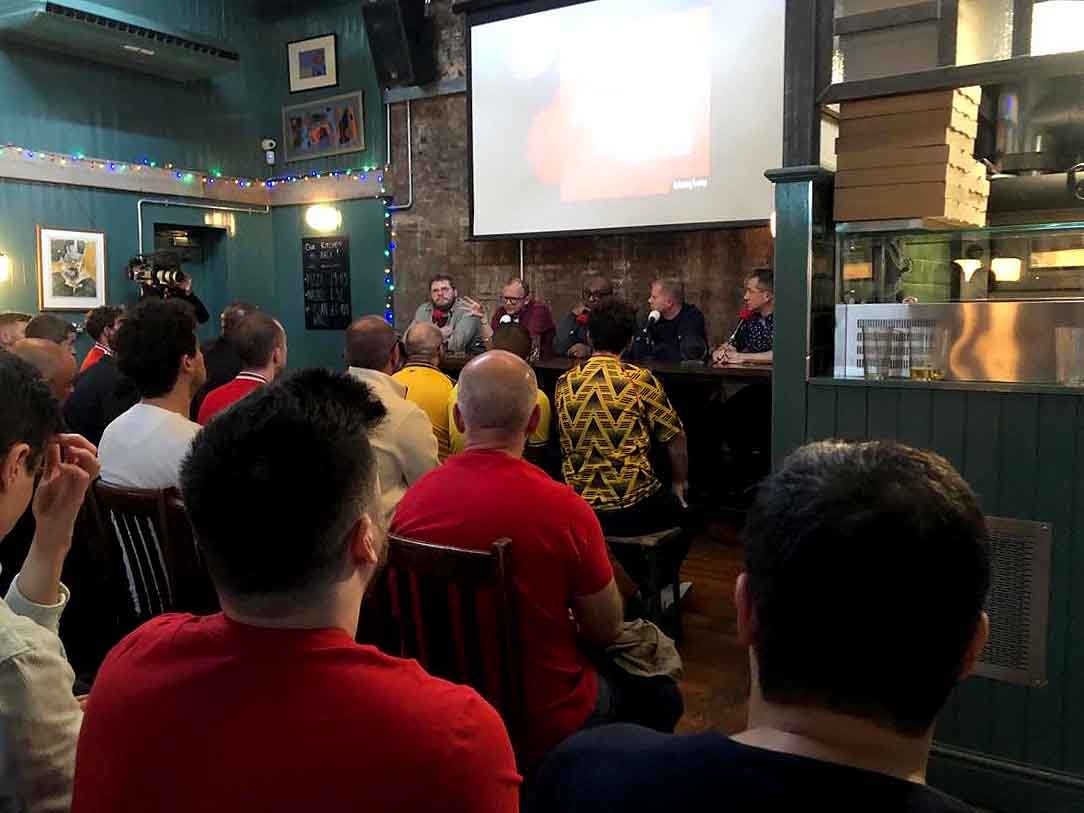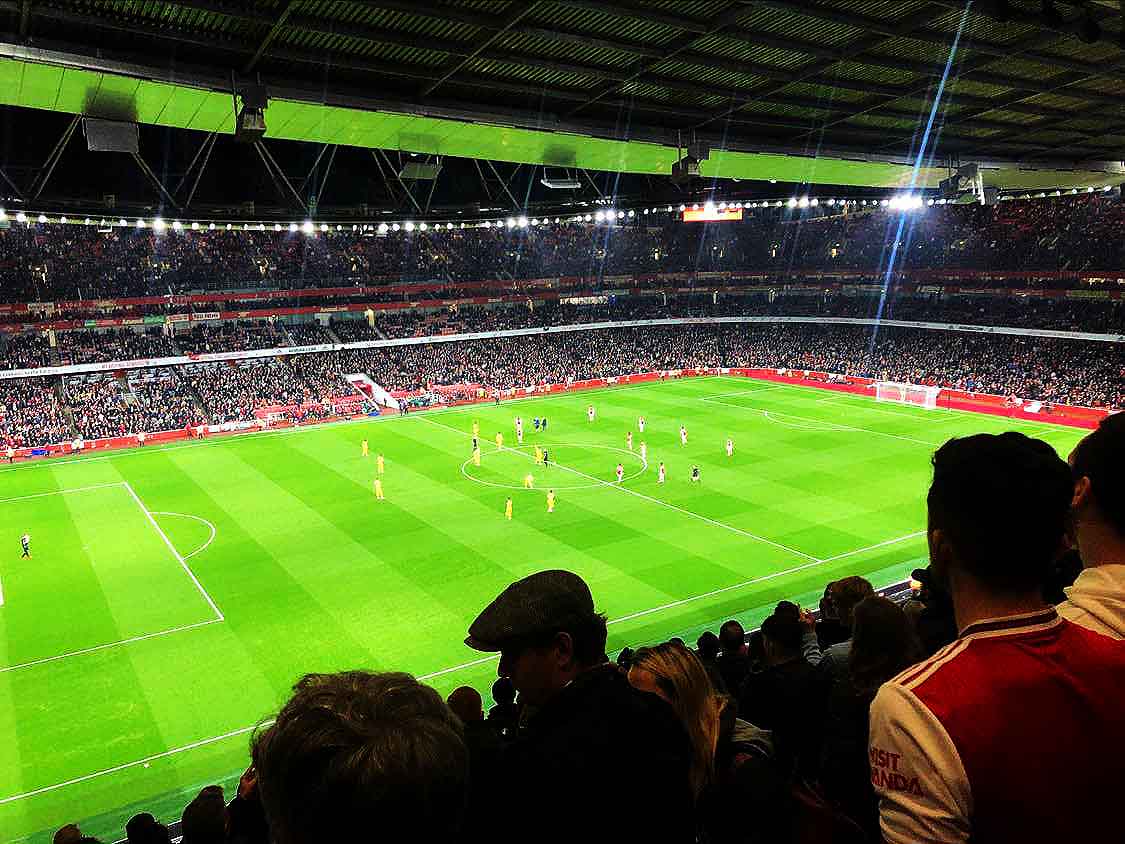
c/o Will Slater
Ok, why not, let’s start with the chicken shop.
It’s called Casey’s Chicken and it smells like grease and piri piri powder. The menu consists of fifteen slightly different combinations of fried chicken and chips. My friend and I, visiting London from our study abroad program in Denmark, only ate there because two random dudes on the street peer pressured us through the door. Behind the counter, guarding the vats of hot oil, stood the patron, forever in character as part mafia don, part neighborhood mayor. He was one of those guys who somehow has a distinct relationship with every passerby. He could sell or convince you of anything.
Casey’s Chicken is in the neighborhood of Islington, just a few minutes down the road from the Emirates Stadium, home of my beloved Arsenal Football Club. We found ourselves at Casey’s the night before their match against Crystal Palace.
I went to London to see Arsenal play in person for the first time. It was a pilgrimage of sorts, to watch the game, but also to discover what it means to be an Arsenal fan in London, surrounded by other Arsenal fans.
Before Casey’s, my friend and I went to an Arsenal podcast event, featuring members of two shows, the “Arsecast Extra” and the “Arsenal Vision Podcast.” I’ve been listening to these podcasts for years. They mean a lot to me. The hard thing about being an Arsenal fan in America is the distance, geographic and cultural. Soccer clubs are international brands, but they’re also quirkily parochial, breathed into life not by sponsorships and TV teals, but by local pubs (like The Tollington, the sprawling yet intimate and iconic Arsenal hangout where we went pre-game the next night), all too familiar London Underground stations, and yes, community-centric fried chicken shops where pretty much all small talk is about the club.
Prior to this trip, these podcasts had always helped me bridge the gap between a local club and my experiences as an international fan. Podcasts are strange. You’ve never met these people and they’ve never met you, but if you listen to someone in conversation for a few hours every week for years, you sort of do know them. Podcasters become like your friends, in a slightly sad, mostly nice kind of way (slightly nice, mostly sad if it’s Joe Rogan).
Elliot Smith, for instance, is this real passionate, maddeningly nervous guy. And he’s always interrupting people on the pod. But he’s just like that, you know? That’s Elliot. You love him for it. Clive Palmer’s a sage. In another time and place, I swear he’d be a religious leader healing the souls of the masses. In ours, he talks about soccer. James McNicholas is hilarious and sharply analytical in the gentlest, warmest way possible. James’ neighbor has become a pantomime villain. The guy is always using his leaf blower while they’re recording.
Three years ago, I found Arsenal the way healthier people might find religion. I had been a fan for several years prior and watched the games each week. But it wasn’t until things started to really go wrong, by my low standards at least — a painful breakup, a tough start to life at Wes, a family move — that I started to depend on Arsenal. It was my outlet, a tool to generate joy and distract from real things. Arsenal offered a way to feel less lonely, but also to truly be less alone. I found people who cared about this club as much as I did, who needed it like I did, and felt validated through them.
As I got better, my relationship with the club changed. I no longer needed it as a distraction and coping mechanism (though sometimes I still use it as exactly that). But Arsenal and the people I had come to associate with it — players, coaches, podcasters, writers, random people on Twitter — meant all the more to me because I had relied on them and they had, without knowing it, come through for me. I couldn’t miss the chance to get to know this community through the podcast event and the pub pre-game.
But you never know what people are actually like, how they’ll actually treat you. They say never meet your heroes. But I chatted with Tim Stillman about club ownership models and Elliot took a genuine interest in who I am (we also took a photo in which we look weirdly alike). I was able to tell a deeply approachable James what he and his work mean to me. My heroes are good people.

c/o Will Slater ’22
So are all the other Arsenal fans I met along the way that weekend. People made me feel at home and like I belong. They didn’t have to, they chose to. It’s wonderful to be in a place in which who you are doesn’t matter. You’re nobody. What matters is who you’re among, what you share, and where you collectively belong.
From The Tollington, we all shuffled down the road towards the Emirates, where people were pounding beers in the concourse and singing old Arsenal songs. You aren’t allowed to bring liquor to the seats.
Arsenal got off to a great start and our star striker, Pierre-Emerick Aubameyang, scored a deserved tap in.
“Who are ya? Who are ya?” we mockingly chanted, pointing at the Palace fans. It was one of the few adversarial chants that wasn’t about Tottenham, Arsenal’s absentee rivals.
Things turned downhill from there and the crowd’s energy struggled to overcome the momentum of the game. Palace began dominating play, pushing Arsenal back. Two sloppy losses of possession in the midfield led to two Palace goals in the second half. All seemed lost. The away fans, confined in their own section not far from our own, were brash and annoying as hell, as they should be. I struggled to enjoy the game. When I watch Arsenal, I adopt their coach’s psycho stress ball vibes.
But then Laca scored. Thank God for Alexandre Lacazette and his 94th-minute equalizer, smashed in at the last gasp from close range. 2-2. It was a purloined draw, which in its own way is sweeter than a well-deserved draw because, well, schadenfreude. “Who are ya?”
When Laca scored, it all made sense. My relationship with this stupid, perpetually underperforming football club made sense. I thought about what Arsenal got me through and how grateful I was for all these lovely, rabid fans losing their voices along with me: a community. I thought about my big brother. I wish he was there. He got me hooked on Arsenal in the first place. The club remains a strong link between us, one of those superficial things made meaningful by love. But alas, he was too busy “starting a new job,” whatever a “job” even is.
I thought about these things for a moment, at least. Then I spent the hour walking home complaining to my friend about the tactics and the individual performances and the referees. He said some version of, “dude, that was an amazing game, enjoy it,” like three times. He was right, of course, but it took me a few more hours to get on board. I needed time. So did my stomach, which still ached from the fried chicken the night before.
As Arsenal legend Dennis Bergkamp said:
“When you start supporting a football club, you don’t support it because of the trophies, or a player, or history, you support it because you found yourself somewhere there; found a place where you belong.”
Will Slater can be reached at wslater@wesleyan.edu
Comments are closed